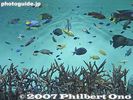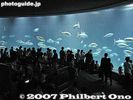 Image search results - "aquarium" Image search results - "aquarium" |

Tokyo Sea Life Park
|
|

Tokyo Sea Life Park
|
|

Tokyo Sea Life Park aquarium
|
|

Tokyo Sea Life Park's main attraction: Tuna aquarium
|
|

Lake Biwa Museum's freshwater aquarium displays fish species endemic to Lake Biwa, found no where else.
|
|

Definitions of endemic, native, endangered, and invasive species.Native species (在来種)
Naturally inhabits Lake Biwa or Shiga and not introduced by man. May also inhabit places outside Shiga.
Endemic species (固有種・亜種)
Native species found only in Lake Biwa or Shiga.
Endangered species (絶滅危惧種)
Those facing a high risk of extinction in the wild.
Invasive species (侵略的外来種)
Introduced by man and harms the native species, environment, and local ecosystem.
|
|

Fish in Reed Beds & Attached Lakes 内湖・ヨシ原にすむ魚 - Reeds are a haven for carps (wataka, ginbuna), bitterlings, gudgeons, and mussels. Invasive species (black bass, bluegill) dominate such habitats today.
|
|
|

Wataka (ワタカ) Ischikauia steenackeri - Endangered endemic species, herbivorous fish.
|
|

Mussel
|
|

Reeds are essential
|
|

Aquarium tunnel showing rocky habitat.
|
|
|
|

Nigorobuna carp (ニゴロブナ 似五郎鮒) - Endangered endemic species, famous for funazushi.
|
|

Gengorobuna carp (ゲンゴロウブナ) - Endangered endemic species
|
|

Lake Biwa Giant Catfish is shy and often hides in its shelter.
|
|

On another day, we were able to see the two Lake Biwa Giant Catfish out in the open. It is nocturnal, and this tank simulates night time while the aquarium is open during the day. The lake's largest endemic species and Japan's largest catfish. �
|
|

Lake Biwa Giant Catfish is the lake's largest endemic species (max. 1.2 meter long), dubbed the King of Lake Biwa.
|
|

The tank simulates night time since the Lake Biwa Giant Catfish is nocturnal.
|
|

Ko-Ayu (コアユ) Native species, popular food fish. Ko-ayu is the small variety of ayu (not baby ayu) commonly eaten as tsukudani (佃煮) or tempura. Adult ko-ayu retain their small size.
|
|

Tempura ko-ayu sweetfish do not grow as large as the ayu sweetfish which grow big in rivers. Ko-ayu remain in the lake and feed on plankton. Such an environment prevents them from getting larger.
|
|

Biwa trout (ビワマス) - Endangered endemic species
|
|

Biwa trout/salmon - Endemic to Lake Biwa and lives in deep, cold (15˚C), pelagic waters. These are juvenile fish. Delicious!
|
|

Lake Biwa Littoral Zone 琵琶湖の岸辺の生き物 - Many small organisms live amid aquatic plants near the shore.
|
|

Numa-ebi shrimp (ヌマエビ), Native species
|
|

Sugo-Moroko gudgeon (スゴモロコ) - Endangered endemic species
|
|

Biwa-kogata-sujishima spiny loach (ビワコガタスジシマドジョウ) - Endangered endemic species
|
|

Biwa-Yoshinobori goby (ビワヨシノボリ) - Endemic species
|
|

Donko sleeper (ドンコ) - Native species endemic to Japan.
|
|

Hon-moroko (honmoroko) gudgeon (ホンモロコ) - Endangered endemic species, but it has been recovering in numbers during the 2020s.
|
|

Utsusemi-kajika sculpin (ウツセミカジカ) - Endangered endemic species
|
|

Utsusemi-kajika sculpin (ウツセミカジカ) - Endangered endemic species
|
|

Abura-higai gudgeon (アブラヒガイ) - Endangered endemic species
|
|

Biwa-higai gudgeon (ビワヒガイ) - Endemic species
|
|

Fish with Unusual Traits 面白い習性の魚 - Gigi talking catfish.
|
|

"Gigi" talking catfish (ギギ) Pelteobagrus nudiceps - Native species
|
|

Tanago bitterling and clam (タナゴ) - Endangered native species, endemic to Japan, lays eggs in living clams.
|
|

Ginbuna carp (ギンブナ) - Native species, reproduces without males.
|
|

Invasive Species 外国からきた魚 - The aquarium has a number of tanks showing invasive species like this Red-eared slider/terrapin (ミシシッピアカミミガメ).Invasive species, popular pet, outcompetes native turtles for physical space.
|
|

Northern snakehead (カムルチー) - Invasive species, eats aquatic insects, mollusks, and carp.
|
|

Red swamp crayfish (アメリカザリガニ) - Invasive species, destroys water plants, outcompetes others for food.
|
|

Black bass (Largemouth bass) are the worst invasive species in Lake Biwa. (ブラックバス・オオクチバス)
|
|

Largemouth bass (black bass) and bluegill are Lake Biwa's worst invasive species. They eat eggs and fry of native fish, crustaceans, and insects.
|
|

Bluegill was brought to Japan in 1960 as a food fish by then Crown Prince Akihito who received it as a gift from Chicago, IL. In 1963, the Fisheries Agency sent bluegill to Lake Biwa. Ten years later, bluegill had spread all over the lake. In 2007 in Shiga, Emperor Akihito expressed regret over bringing the bluegill.
|
|

Around the lake are disposal bins for invasive fish. Do not throw invasive fish back into the lake.
|
|

Koi or Nishiki-goi (錦鯉) - Ornamental common carp.
|
|

Midstream River Fish 川の中流の生き物 - Pale chub and dark chub with streamlined bodies suited for river currents. At bottom are pike gudgeon.
|
|

Dark chub (カワムツ) - Native species
|
|

Upstream River Fish 川の上流の生き物 - Fish favoring cold water such as char and red-spotted masu salmon.
|
|

Red-spotted masu salmon - Endangered native species (サツキマス・アマゴ)
|
|

Japanese stream toad (ナガレヒキガエル) - Native species, endemic to Japan.
|
|

Water Birds 水辺の鳥 Little Grebe (カイツブリ) - Native species, Shiga's official bird (県の鳥).In classic literature like Tale of Genji, Lake Biwa is called, "Lake of Little Grebes" (Nionoumi).
|
|
|
|

Tundra swans and bean geese winter on Lake Biwa.
|
|

Hariyo three-spined stickleback - Endangered native species (ハリヨ)
|
|

Fish Conservation and Breeding Center 保護・増殖センター - They breed endangered freshwater fish species and research breeding methods.
|
|

Lake Fish from Other Countries 世界の湖の魚たち - Chinese high fin banded shark (エンツュイ) from Lake Dongting, China.
|
|

Iridescent shark (カイヤン) from Tonlé Sap Lake, Cambodia.
|
|

Tinfoil barb (シルバーバルブ) from Tonlé Sap Lake, Cambodia
|
|

Electric catfish (デンキナマズ) from Lake Tanganyika, Africa
|
|

Lake trout (レイクトラウト) from The Great Lakes, North America
|
|

Sturgeon is also famous for caviar.
|
|

Sturgeon are ancient fish
|
|

Feeding time for sturgeon.
|
|
|
|

Sturgeon feeding
|
|
|

Touching Corner ふれあい体験室 - Petting zoo for crayfish and small fish.
|
|
|
|

Lake Biwa and the Lakes of the World
|
|

USA (Great Lakes)
|
|

Other exhibition rooms
|
|

Geological History of Lake Biwa - Exhibition Gallery A 琵琶湖のおいたち(A展示室)
|
|

Seventeen million years ago, southeastern Shiga was under a warm ocean. Fossils of dolphins and this baleen whale bone (replica) have been found in Tsuchiyama, Koka.
|
|

Replica of a Stegodon elephant skeleton similar to the Mie elephant that roamed along the shores of Lake Biwa's forerunner lake 3.5 to 4 million years ago.
|
|

Two million years ago, the Mie elephant had become extinct and this smaller Akebono elephant lived in Shiga until it became extinct 1 million years ago. Mie elephants roamed a subtropical lake land 3 to 4 million years ago.
|
|
|
|

Mie elephants once roamed this area.
|
|

Lake Biwa's forerunner Lake Oyamada emerged about 4 million years ago southeast of Shiga in Iga, Mie Prefecture. Over millions of years, at least two lakes formed and disappeared before Lake Katata (western Otsu) formed.
|
|

This lake got larger and deeper as geological protuberances 400,000 years ago pushed it to where Lake Biwa is today. South Basin on the left is much shallower than the North Basin.
|
|
|
|

Lake Biwa's endemic species. The lake's long history and diverse habitats (rocky areas, sandy beaches, attached lakes, reeds, cold waters, pelagic zones) gave rise to these 17 endemic fish and 30 mollusk species.
|
|

Endemic mussel used to produce Biwa pearls, now extinct.
|
|

People and Lake Biwa - Exhibition Gallery B 人と琵琶湖の歴史(B展示室)
|
|

Humans appeared around Lake Biwa about 9,000 years ago, mainly along the South Basin. They ate nuts, lake fish and shellfish, and wild animals.
|
|

Awazu Shell Mound of food waste from 4,500 years ago excavated in 1990-91 near Seta River. 粟津貝塚
|
|

The shells are mostly endemic Seta shijimi clams.
|
|

Seta-no-Karahashi Bridge on the old Tokaido Road over the Seta River in Otsu. It was the eastern gateway to Kyoto. 瀬田の唐橋
|
|

Underwater foundation of the Seta-no-Karahashi Bridge from the 7th century. Discovered in 1988 about 80 meters downstream from the present bridge.
|
|

Maruko-bune, a traditional wooden boat mainly for shipping cargo across Lake Biwa in the old days. 丸子船
|
|

Maruko-bune were a vital transportation link between northern Japan and Kyoto/Osaka. Goods coming and going via the Sea of Japan also went over the lake.
|
|

Most of the wood is Japanese conifer (槇の木).
|
|

The cargo was mainly rice, fish, and kelp.
|
|

The bow's tip is studded.
|
|

Checkered pattern was unique to Lake Biwa boats.
|
|

Black copper plates decorate the bow (ダテカスガイ). The wood seams are stuffed with conifer fiber (槙縄) to repel water.
|
|

Maruko-bune's trademark is this half-round cedar or cypress log on both sides. おも木
|
|

The boat's bottom is flat, suited for shallow waters.
|
|

At 19 meters long, 2.4 meters wide, and 12 meters high.
|
|

The sail is made of thick cotton material, replacing the old straw mat that didn't last long.
|
|

Rudder hangs down from a torii-like brace (かさ木), also used as a mast rest when the mast is laid down.
|
|

The museum's maruko-bune was built by Shiga's last maruko-bune builder, Matsui Sanshiro (松井三四郎) and his son in 1995 in Seta, Otsu.
|
|

Born in 1913, Mr. Matsui built several maruko-bune until the 1930s. The completed boat sailed to the museum.
|
|

Maruko-bune transported rice, fish, kelp, and many other northern Japan goods bound for Kyoto/Osaka. From Kyoto, came cotton, confections, soy sauce, sake, kimono, textiles, tobacco, and more.
|
|

Hari-bune, a traditional fishing boat mainly for longline fishing (延縄). There is no half-round log on the side, so it is not a maruko-bune. ハリブネ
|
|
|

During the 17th and 18th-centuries, over 1,000 maruko-bune sailed on the lake. The busiest ports were Shiotsu in the north and Otsu. After railroads were built, maruko-bune dwindled.Today, there are no maruko-bune on Lake Biwa.
*Diorama of Oura Port at Maruko-bune Museum in Nagahama.
|
|

Maruki-bune was the lake's first primitive boat, a dugout canoe made from a single log. This one dates from 3,000 years ago (Jomon Period). 丸木船
|
|

About 30 ancient maruki-bune have been found in Shiga, mainly in the Hikone-Maibara area. This one dates from 1,800 years ago (Yayoi Period). 丸木船
|
|

Maruki-bune replica displayed at the Azuchi Castle Archaeological Museum in Omi-Hachiman. 滋賀県立安土城考古博物館In 1990, the Shiga Prefectural Association for Cultural Heritage had this replica made for a successful voyage from northern Nagahama to Chikubushima island, proving its viability.
|
|

Lake Environment and Lifestyle - Exhibition Gallery C 湖の環境と人々のくらし (C展示室)
|
|

Gallery C - Large floor photo of the Lake Biwa basin. About 120 rivers flow into Lake Biwa. 琵琶湖盆地
|
|

See how our lives have changed during 1955 to 2005. Represented by technology and pop culture. わたしたちくらし50年
|
|

Life in the countryside before tap water and sewerage. Rural kitchen sink called kawaya. 農村のくらし
|
|

Water was taken from a ditch and well. The fish in the ditch ate food scraps from washed dishes.
|
|

Riverside forests in Shiga are now rare due to development. They were a wildlife haven. The bamboo was also useful. 川岸林
|
|

Fisherman scooping fish from a traditional fish trap called eri. エリ
|
|

Traditional eri is an arrow-shaped bamboo fence in the water pointing away from shore. When fish encounters the center fence, it instinctively swims toward deeper water. 早崎内湖ビオトープ
|
|
|

The center fence thus leads the fish to the trap holes (ツボ) in the trap's labyrinth.
|
|

Fish's view of going to the trap hole. Eri has been in use for 1,500 years. Eri today have more sophisticated shapes and use modern materials instead of bamboo.
|
|

Exhibit of live plankton collected from Lake Biwa every morning.
|
|

Observe live plankton through the microscope or on the monitor. A high concentration of plankton is obtained from a net thrown 10 meters into Lake Biwa.
|
|

Aquatic parasites. A few are endemic to Lake Biwa.
|
|

Discovery Room - Hands-on exhibits for kids (free admission) ディスカバリールーム
|
|

Enter the crayfish and control its claws. ザリガニになろう
|
|

Freshwater jellyfish (マミズクラゲ) - Likely the world's longest exhibit of freshwater jellyfish (since Aug. 2, 2012). (No longer displayed in the Discovery Room).Although these delicate jellyfish live all over Japan, they appear and disappear at a whim. So it's hard to catch them for a continuous exhibit.
|
|

They grow from polyps and feed on plankton for a 6-month lifespan. They like non-filtered and non-circulating water. The museum succeeded in breeding and raising freshwater jellyfish. This display will continue as long as possible.
|
|

Exhibit of sow bugs in Shiga (ワラジムシ). Sow bugs are crustaceans. During the 2006-2010 survey, 22 species of sow bugs were found in Shiga. Seven of them were previously unknown (pink), but not necessarily endemic to Shiga.
|
|

Special Exhibit: Kunimasu Trout, Once Thought Extinct (black kokanee) Read about it here.[企画展示室] よみがえった魚: クニマス
Oct. 26 – November 24, 2013
Five artificially-hatched kunimasu trout, originally endemic to Lake Tazawa in Akita Prefecture, were exhibited. Kunimasu was thought to be extinct since the 1940s when Lake Tazawa became too acidic due to man-made causes. In 2010, kunimasu was rediscovered in Lake Saiko at the foot of Mt. Fuji in Yamanashi Prefecture.
Apparently, they successfully bred from eggs sent to Lake Saiko in 1935. Local fishermen knew about the fish, but did not know it was kunimasu. Sensational fish story.
Extinct in Lake Tazawa, Oncorhynchus kawamurae
|
|
|
|
|
|